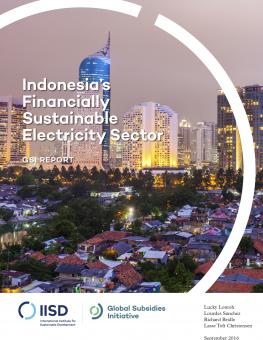
Indonesia's Financially Sustainable Electricity Sector
This paper reviews the ability of Indonesia’s electricity sector to meet the country’s need for electricity in a financially sustainable way.
In addition to Indonesia’s objective of increasing the share of renewable energy in their generation mix, the country’s electricity sector is facing a number of challenges, notably the need to meet rising demand for electricity and to serve consumers in geographically remote regions.
In order to respond these challenges, the government has launched a set of initiatives that are indeed increasing generation capacity, expanding electricity networks and improving quality of supply. But is this enough to meet the government’s targets?
This report demonstrates that subsidies are still an important part of the state-owned electricity company and that remote areas are not seeing previous improvements in the same way as populated ones are. Also, coal generation is getting the main focus of the capacity-increase programs, despite the important potential of renewable sources.
The document concludes that the largest challenge for Indonesia’s electricity sector might be to move beyond providing electricity to delivering electricity in a sustainable manner. It should rely less on coal and assure an efficient electrification of remote areas, evaluating the potential of decentralized generation based on renewable capacity.
Participating experts
You might also be interested in
How Indonesia's Incoming President Can Advance the Transition to Clean Energy
With Prabowo Subianto inaugurated as Indonesia’s President, speculation abounds about the new administration’s commitment to the clean energy transition and climate targets, given Prabowo’s positioning as the “continuity candidate.” The question is, what, exactly, will be continued?
What the war in Ukraine means for Asia's climate goals
The queues outside petrol pumps in Sri Lanka have lessened, but not the anxiety. Asanka Sampath, a 43-year-old factory clerk, is forever vigilant. He checks his phone for messages, walks past the pump, and browses social media to see if fuel has arrived. Delays could mean being left stranded for days. "I am really fed up with this," he said. His frustrations echo that of the 22-million inhabitants of the island nation, facing its worst ever economic crisis because of heavy debts, lost tourism revenue during the pandemic, and surging costs. The consequent political turmoil culminated with the formation of a new government, but recovery has been complicated by Russia's invasion of Ukraine, and the consequent upending of global energy markets.
Curbing fuel subsidies is only the first step out of energy crisis
Indonesia’s fuel subsidies have been a recurring problem for the country’s economy. For years, they have been weighing on the state budget, providing unjust support for fossil fuels and slowing the much-awaited clean energy transition. But skyrocketing global energy prices could require the country to allocate a colossal Rp 700 trillion (US$46.6 billion) for energy subsidies this year – more than four times the budgeted amount.
Switching Fossil Fuel Subsidies in Indonesia to Support a Green Recovery
This brief looks at how Indonesia can start actively promoting renewable energy by removing the existing hurdles to its deployment—such as unattractive renewable energy feed-in tariffs and land and infrastructures barriers—and switching public support from fossil fuels to renewables to meet the country’s clean energy targets.